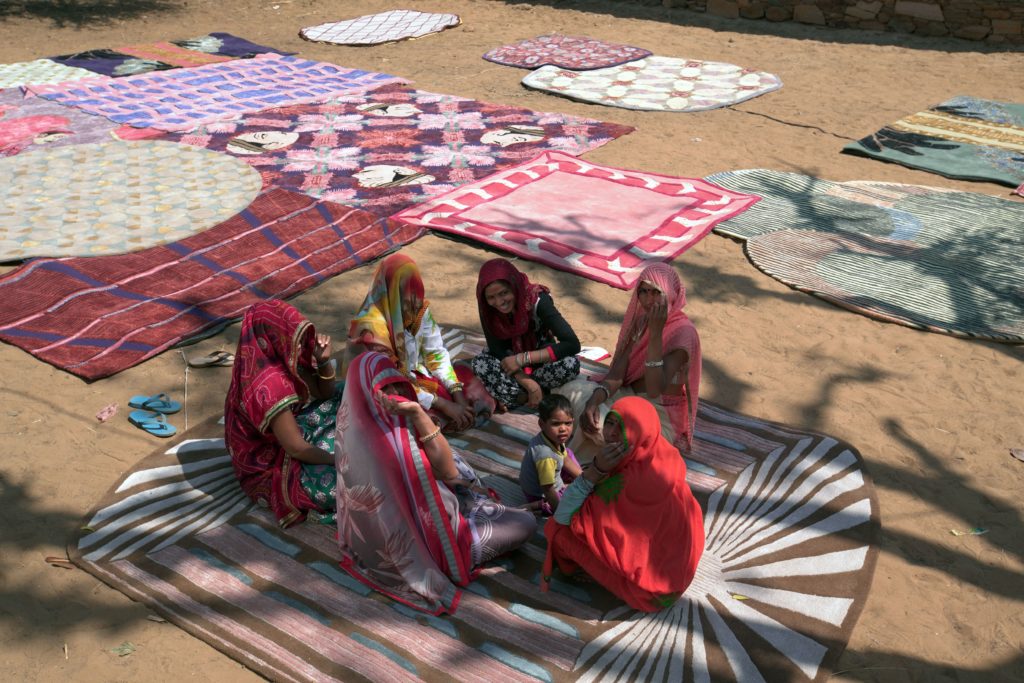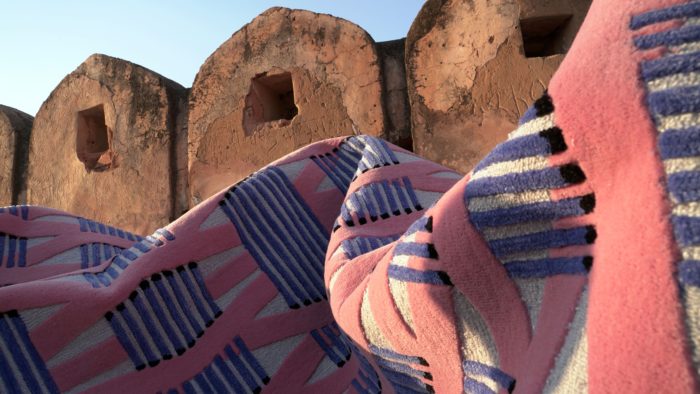In 1978, Nand Kishore Chaudhary laid the foundation of Jaipur Rugs with two looms and just nine weavers. With his business philosophy emphasizing on using age-old art forms of handmade carpets as a tool to bring socioeconomic prosperity in the remotest villages of India, Jaipur Rugs, today, provides sustenance to over 40,000 artisan households.
While rooted in these ideals of reviving and promoting the Indian art of carpet weaving, Jaipur Rugs has also made inroads to the global luxury markets, carving a niche for itself in the domain of design and crafts. In this interview with CSP, Mr Nand Kishore Chaudhary and his son Yogesh Chaudhary talk about building the brand for Jaipur Rugs as a luxury product and parallelly nurturing the artisan and weaver communities of India.
How has Jaipur Rugs carved a niche for itself in the global luxury market?
We like to think of Jaipur Rugs as a platform for the artisans to take their craft and their stories to the world. We believe the artisan is the true hero and his unique, ancestral know-how is a ceaseless source of rich and authentic stories that appeal to a global audience. These stories, in turn, weave an incredible picture of India and its authentic art forms and helps shape its rich cultural identity.
For any buyer, domestic or international, the uniqueness of its design and the quality of the carpet are the two most important deciding factors. Jaipur Rugs and holds the largest variety of ready to ship carpets in all sizes, shapes, colours and designs and provides the highest quality of hand-made rugs. It has an end-to-end business model, which helps in maintaining the quality and authenticity of the product throughout the supply chain.
Moreover, a lot of customers are looking for carpets that are ethically made and do not harm the environment. Our production process is therefore geared to meet the evolving consumer standards and conform to the highest certifications for quality and ethical production. We have a satisfied base of customers across 65 countries including Russia, China and the United States.
What inspires and influences your designs? Is there a traditional motif or a design which is your favourite?
Our designs are an expression of our surroundings, nature, art and the trends driving the design and culture industry. The Indian craft industry always had its own visual on what it produced. But the way the world is changing it is important to make products that are suitable to fit where they are to be used. In home décor, for example, the global trend leans towards modern and contemporary pieces and we have to adapt ourselves to create items that fit this trend using our unique visual language. Jaipur Rugs offers a curated line up of contemporary, traditional, transitional, modern and eclectic rugs in over 3000 colours. It creates contemporary works of art by collaborating with internationally acclaimed designers as well as local artisans and weavers capable of showcasing the ancestral craft of carpet weaving with a new vision. Traditional flower motifs and vectors have a special place in my heart as those are the designs that I started this journey with.
It has been over four decades now since Jaipur Rugs was established by you. How has the journey been so far?
It all began in 1978 when I started this journey with two looms and nine artisans in my family home in Churu, Rajasthan. Due to certain social biases prevailing at that time, I had to work against the system to realise my dream of working hand-in-hand with the weaver community to create the best quality handwoven carpets. By building deep connections with the rural communities I was able to gain their trust and began bringing livelihood opportunities to more and more underprivileged households. In pursuit of expanding the base of artisans and keeping alive this ancestral art form, I moved to Gujarat and spent nine years training more than 2500 people from the tribal community.
Since the beginning, I felt comfortable working directly with the weavers, training and upgrading their skills to deliver quality work. This also allowed me to eliminate the middlemen involved, who would often adopt harsh labour norms, that in turn defamed the carpet-weaving industry. Gradually, we expanded our pool of artisans across India. We also entered the export market as early as 1986. Today, Jaipur Rugs works harmoniously with a number of ethnically diverse communities spread across 600 villages in five states that lie in some of the most impoverished regions of India.

How does your entrepreneurship model connect the pan-India network of artisans to the luxury-market for carpets?
For Jaipur Rugs the artisans are the cornerstones of its business ideals. Our mission is to serve as a social innovator, promoting the cause of artisans (especially women) by providing them with opportunities and enabling socioeconomic development. To achieve this, we try to train and nurture artisans in remote villages in five states across India and provide sustainable livelihood to them at their doorstep. The inclusive business model has allowed us to turn craft into a tool for change. We also strive to meet some of the UN Sustainable Development Goals: poverty alleviation, gender equality and decent work and economic growth and Responsible consumption and production.
Jaipur Rugs has also started a creative social experiment – the Artisan Original initiative. This initiative has been introduced by Jaipur Rugs to tap into the untamed fashion from the villages of India. It experiments with the originality of rural craftsmen to nurture their creative potential, which is unexplored at a global stage. For the first time ever, weavers get to be the designers of their own rugs. Each rug in the collection is a masterpiece for the design inspiration it weaves. It is imbued with the individuality of its artisan evident in unique artistry.
This collection has also won numerous awards including the German Design Award, Elle Décor Award, Carpet Design Award and the European Product Design Award. Awards are like a pat on the back for the efforts that went into making the authentic product that won the hearts of the jury and other. It is a moment of joy for the people and the artisans who have worked tirelessly to make the brand stand out from hundreds of participants from across the globe.
Through the Artisan Originals initiative, rural men and women who have either had no education or just primary education, have stunned the world with original designs competing with professional designers and mega design houses on the global stage. This one of its kind of social innovation has resulted in important transformations in the life of the weavers.
It has renewed their passion for weaving, given them self-confidence and recognition from their own communities. They have discovered themselves in a way they had never imagined. The project has facilitated the economic transformation of weavers who used to work as mere wage earners.
With the regular supply chains coming to a standstill due to COVID-19 crisis, how do you see the future of creative entrepreneurship, particularly in the domain of arts and crafts?
The internet has shrunk the world. One of the most effective ways to tell your story to a large base of the audience is by making it go digital. Amidst the current crisis, we would be launching our new collection – Concoction digitally, across social media platforms. Similarly, ventures such as Etsy can provide immense market access to creative entrepreneurs. However, there is lot more scope for creative founders to also develop a strong business strategy. I think we need to have more programs for creative people where we can help them chisel their business acumen. There are a lot of people who are trying to do this, but more needs to be done in this regard so that creative entrepreneurship can flourish in a more vibrant and consolidated business environment.
Photo credit: Davide Calafa





